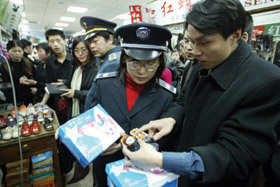Chapter VIII Patent Administrative Protection
The Sixteenth Congress of the Communist Party of China explicitly demanded the improvement of intellectual property protection system. Among the tasks of constructing the nation's modernization systems from the Third Plenary Session of the Sixteenth Congress, improvement of IP protection system was included. It would be a directive for the nation's IP protection work. Regulating and standardizing market economy order is a long-term task for the nation. At the National Conference on Regulating and Standardizing Market Order in April 2003, raiding patent infringement was listed one of the key tasks of the SIPO. SIPO also became a Member Unit of the National Market Order Regulation Leading Group.
According to the spirits of the Conference and State Regulation Working Plan, the SIPO established the Market Order Regulation Leading Group with a Commissioner as its head in April. In May, the group launched an working plan to regulate the IP office system. Following this plan, provincial level IP offices established their own leading groups to make plans considering local actual situations and take measures in enforcing the laws in the field of goods circulation to promote the increase of IPR protection level and the deepening of regulating activities. In May, following the orders of the National Leading Group, with the principles of clearing both roots and stems and intensifying clearing roots, the SIPO reported the construction plan for the system's credit system. Meanwhile, during the SARS outbreak, the SIPO issued the Notice on Strengthening IPR Protection during the Period of Fighting SARS. All regions intensified their IPR protection in the fields of pharmacy and food accordingly.
By 2003, more than 20 provinces have promulgated their patent protection or administration regulations. Some vice-province level patent trial cities also issued their owns. These activities offered more legal basis for the improvement of China's patent protection.
In all foreign-related IPR cases, China abided the principle of making the judgement impartially based on the law. SIPO required all local IP offices, based on the laws, to protect the legitimate interests of IPR owners from both home and abroad, and local IP offices at all levels directed domestic companies to avoid infringing others'IPRs during R& D and sales activities.
In February, the SPO issued a notice on further improving raiding IPR counterfeiting to local offices, requiring them by reviewing the high-profile issues of this year, to intensify administrative enforcement and enhance handling of foreign-related and high-profile cases, improve their enforcement cooperation and case-handling efficiency, further eliminate local protectionism and ensure the implementation of the WTO rules in China.
In July, the SIPO sent a notice to require IP offices of provinces and patent trial cities to establish an annual reporting system of annual local IPR protection status through creating favorable environment and adopting measures. Presently, Shanghai and Wuhan have implemented their reporting systems of annual local IPR protection status while many provinces and trial cities are in preparing for it.
The SIPO holds a working conference on enforcement of IP offices annually, which offered new requirements for improving enforcement and stringently protecting legitimate interests of IPR owners from both home and abroad.
Following the notice on enhance coordination and cooperation in handling IPR violations, a notice jointly issued by the SIPO, the Ministry of Public Security and SAIC, in March, the three offices held a joint session on enforcement. The session focused on intensifying coordination in raiding of IPR criminal violations and case transfers. The session proposed to add the Supreme People's Court and the Attorney General's Office as member units. Both offices had agreed. A memo of the session had been distributed to all over the nation. Local authorities had actively carried out the spirit of the session and further improve their coordination during the IP enforcement.
Relying on their advantages of simpler process of administrative enforcement, professional caliber and quick resolutions, the local IP offices handled patent disputes, cracked down on faking others'patents and faking patent identities with high efficiency. For example, in 2003, patent administrative authorities of provinces received 1,517 patent disputes, resolved 1,237 and established 1,873 cases of faking patent identities and 164 cases of faking others'patents.
The SIPO made demands to the local IP offices in specialized enforcement operation and made necessary deployment. For example, during March 15 International Day for the Protection of Consumers'Interests, April 26 World Intellectual Property Day and Fighting SARS, local IP offices in cooperation with other local enforcement agencies conducted open and concentrated operations to crack down on counterfeiting activities in the circulation area. The SIPO also organized cross-region joint enforcement operations.
The SIPO held the National Patent Enforcement Conference on December 23 in Beijing. The conference checked and summarized the implementation of tasks deployed by the National Conference on Regulating and Standardizing Market Order, studied highlighted issues for present patent enforcement and deployed tasks for the next phase.

Beijing IP Administration conducts IPR enforcement activity
2013-07-17 Print
Print